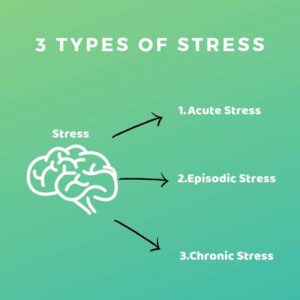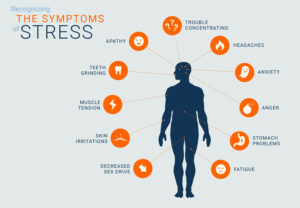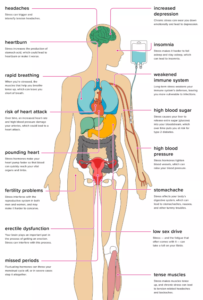Stress is something we all know about. But how much do we know? Perhaps only knowing when we have it, right? Hopefully, by the end of this article, you will know all about, stress: the facts.
What is Stress?
Stress is a natural physical and mental reaction to what may be perceived as an extreme situation or circumstance. Everyone experiences stress from time to time. Anything from everyday responsibilities such as work and family to grave life events such as a new diagnosis from the doctor, war, or the death of a loved one can trigger stress. For urgent, short-term situations, stress can be beneficial to our health. It can help an individual cope with possible serious situations. The body responds to stress by releasing hormones
that increase the heart and breathing rates and ready the muscles to respond.
Is Stress Bad?
Stress isn’t inevitably a bad thing. It can be healthy in cases where it helps one avoid an accident, meet a certain deadline, or keep our intellect intact in the midst of chaos.
Everybody feels stressed at times, but what one individual finds stressful may be very different from what another individual finds stressful. An example of this would a long transcontinental flight. Some love the thrill of it and others may be paralyzed at the very thought of it.
Although stress isn’t always bad, the important element in the equation is that it should be temporary. Once the emergency/crisis moment has passed, the heart rate and breathing should slow down and the muscles should relax. In a short period of time, the body should return to its natural state without any lasting negative effects.
But we know what too much of a good thing is. Therefore, in contrast, acute, recurrent, or extended stress can be mentally and physically damaging.
Unfortunately, it’s somewhat common. A survey revealed that 80 % of Americans reported that they had at least one symptom of stress in the past month. Twenty percent (20%) reported being under extreme stress.
Because of the busy lives we lead, it’s impossible to eliminate stress altogether. But there are ways to avoid it when possible and also manage it when it’s inescapable.
Causes of Stress
Some standard causes of acute or chronic stress include:
- Surviving a life-threatening accident or illness
- Being the victim of a crime
- Living through a natural or manmade disaster
- Living with a chronic illness
- Experiencing familial stress situations such as:
- an unhappy marriage
- prolonged divorce proceedings
- child custody issues
- an abusive relationship
- Working in a dangerous profession
- Being a caregiver for a loved one with a chronic illness.
- Being homeless or living in poverty
- Having negative work experiences
- Deployment in the military
The conditions that can cause a person’s stress are endless because they are as diverse as individuals are.
Whatever the source, the effect on the body can be serious if left untreated.
Forms of Stress
There are several kinds of stress. They include:
- acute stress
- episodic acute stress
- chronic stress
Acute stress – Everyone experiences acute stress. It is the body’s instant response to a new and challenging circumstance. It is the kind of stress one may feel when narrowly escaping a car accident.
Acute stress can additionally result in something that you actually enjoy. It’s rather frightening; yet exhilarating feeling one may get on a roller coaster or perhaps when skiing down a vertical mountain slope.
Acute stress incidents such as these don’t normally result in any harm to the body. They might even be beneficial to an individual. Stressful situations give the body and brain practice in formulating the best reaction to future stressful situations.
Once the danger passes, the body’s systems should return to normal.
However, severe acute stress is different. This type of stress, such as when one is faced with a life-threatening situation, can be the forerunner to post-traumatic stress disorder (PTSD) or other mental health problems.
Episodic acute stress – Episodic acute stress is when an individual has frequent incidents of acute stress.
This can happen if someone is often anxious and worried about things he or she suspects may happen. The individual may feel that their life is chaotic and seemingly go from one crisis to the next.
A variety of professions, such as law enforcement or firefighters, may additionally lead to recurrent high-stress situations.
Similar to severe acute stress, episodic acute stress can affect physical health and mental well-being.
Chronic stress – Chronic stress is when you have high-stress levels for an extended period. Long-term stress like this can have a negative impact on an individual’s health. It can contribute to:
- cardiovascular disease
- anxiety
- high blood pressure
- depression
- a weakened immune system
Chronic stress can additionally lead to recurrent ailments such as headaches, an upset stomach, and sleep difficulties. Acquiring knowledge of the various types of stress can help.
Symptoms of Stress
Just as there are a variety of things that can cause stress, symptoms can be different also.
Even though it is unlikely for an individual to have them all, below are some symptoms you may experience if you’re under stress:
- insomnia and other sleep problems
- chronic pain
- digestive problems
- lower sex drive
- over or under eating
- difficulty concentrating and making decisions
- fatigue
One may feel overwhelmed, irritable, or fearful. Also, one may unwittingly be drinking or smoking more than they used to.
Headache – Stress headaches, also known as tension headaches, are caused by tense muscles in the face, head, and neck. Some of the symptoms of a stress headache are:
- feeling a band of pressure around the forehead
- tenderness of the scalp and forehead
- mild to moderate dull head pain
Various triggers that can spark a tension headache. But tight muscles could be due to emotional stress or anxiety.
Ulcer – A stomach ulcer — a type of peptic ulcer — is a sore on the lining of your stomach that’s caused by:
- Infection with a stomach bacteria—helicobacter pylori (H. pylori).
- Long-term use of nonsteroidal anti-inflammatory drugs (NSAIDs) such as Advil, moltrin, and alleve.
- rare tumors and cancers
Research as to how physical stress interrelates with the immune system is currently ongoing. It is believed that physical stress may affect how one may heal from an ulcer. Physical stress can be due to:
- serious long-term illness or injury
- a surgical procedure
- trauma or injury to the brain or central nervous system
Consecutively, the heartburn and pain of a stomach ulcer can lead to emotional stress.
Eating excessively – Some individuals act in response to stress by eating, even if they’re not hungry. If one should find themselves eating without thinking, eating heavily in the middle of the night, or generally eating much more than usual, they may be stress-eating.
When individuals stress eats, they take in a lot more calories than they need and they’re probably not choosing the healthiest foods. This can lead to fast weight gain and several health problems. Additionally, it does little to nothing to resolve the stress.
Work Stress – Work can be a cause of great stress for a variety of reasons. This type of stress can be occasional or chronic.
Stress at work can come from:
- The feeling of a lack of power or control over what happens
- Feeling stuck in a job that one dislikes and seeing no alternatives
- Being made to do things an individual doesn’t think he or she should do
- Involved with a conflict with a co-worker
- Being overworked or having too much asked of an individual
If one is in a job they hate or are constantly responding to the demands of others’ without any control, stress seems unavoidable. Finding balance and managing stress is important to maintain optimal mental health.
Anxiety – Stress and anxiety frequently go hand in hand. While stress comes from the demands placed on the brain and body, anxiety is when an individual feels high levels of worry, uneasiness, or fear.
Anxiety can certainly be a consequence of episodic or chronic stress.
Having both stress and anxiety can have a severe negative impact on health, making an individual more likely to develop:
- Heart disease
- High blood pressure
- Depression
- Diabetes
- Panic disorder
Stress and anxiety both can be treated. There are varieties of strategies and resources that can help with both.
The Effects of Stress on the Body
As mentioned earlier, stress is helpful. It’s a natural physical and mental reaction to life occurrences. However, if the stress response doesn’t stop reacting, and the stress levels stay raised way longer than is necessary for survival, it can seriously affect health by causing problems with the following bodily systems.
Central nervous and endocrine systems – The central nervous system (CNS) is in charge of the “fight or flight” response mentioned earlier. In the brain, the hypothalamus starts the process by telling the adrenal glands to  release the stress hormones adrenaline and cortisol. These hormones increase the heartbeat and send blood rushing to the areas where it is needed the most in an emergency, such as the muscles, heart, and other crucial organs.
release the stress hormones adrenaline and cortisol. These hormones increase the heartbeat and send blood rushing to the areas where it is needed the most in an emergency, such as the muscles, heart, and other crucial organs.
When the fear is gone, the hypothalamus should tell the systems to go back to normal. If the CNS does not to normal, or if the stressor doesn’t depart, the response will continue.
Respiratory and cardiovascular systems – Stress hormones affect the respiratory and cardiovascular systems. During the stress response, breathing increases to quickly distribute oxygen-rich blood to the body. If an individual already has a breathing problem such as asthma or emphysema, stress can make it even harder to breathe.
While under stress, the heart additionally pumps faster. Stress hormones trigger the blood vessels to constrict and divert more oxygen to the muscles enabling more strength to take action. However, this additionally raises blood pressure.
Consequently, frequent or chronic stress will cause the heart to work too hard for too long. When the blood pressure rises, so does the risk of having a stroke or heart attack.
Digestive system – Under stress, the liver produces extra blood sugar (glucose) to produce a boost of energy. When under chronic stress, the body may not be able to keep up with this extra glucose surge. Therefore chronic stress may increase the risk of developing type 2 diabetes.
This shot of hormones, increased breathing, and elevated heart rate can additionally upset the digestive system. It is also more likely to have heartburn or acid reflux due to an increase in stomach acid. Stress doesn’t bring about ulcers (a bacterium called H. pylori often does), but it can increase the risk for them and cause existing ulcers to worsen.
Stress can also affect the way food moves through the body, leading to diarrhea or constipation. One might additionally experience nausea, vomiting, or a stomachache.
Muscular system – The muscles tense up to guard themselves against injury when the body is stressed. They tend to release again once an individual relaxes, but when constantly under stress, the muscles may not be able to relax. Tight muscles bring about headaches, back and shoulder pain, and body aches. Ultimately, this can set off an unhealthy cycle as to discourage exercising and instead opting for pain medication for relief.
Reproductive system – Stress is draining on both the body and mind. It’s not unusual to lose sexual desire when under constant stress. While short-term stress can cause men to produce more of the male hormone testosterone, this effect doesn’t usually last.
Conversely, if the stress continues for a long time, a man’s testosterone levels can commence to drop. This can hinder sperm production and cause erectile dysfunction or impotence. Chronic stress may also increase the risk of infection for male reproductive organs such as the prostate and testes.
For females, stress can affect the menstrual cycle. It can lead to irregular, heavier, or more painful menstrual periods. Chronic stress can additionally increase the physical symptoms of menopause.
Immune system – Stress fires up the immune system, which can be a benefit for immediate situations. This stimulation can help avoid infections and heal wounds. But over a period of time, stress hormones will weaken the immune system and reduce the body’s response to foreign invaders. Individuals under chronic stress are more vulnerable to viral illnesses such as the flu and the common cold, in addition to other infections. Stress can also increase the time it takes to recuperate from an illness or injury.
How to Manage Stress
The goal of stress management isn’t to remove it completely. Because it’s not only impossible but as mentioned, stress can be healthy in some situations.
To manage stress, first, one would have to identify the things that cause the stress — or the triggers. Then figure out which of these things can be avoided. Then, find ways to cope with those negative stressors that can’t be avoided. Sometimes a change in attitude towards something or a situation is helpful.
Over time, managing stress levels may assist with lowering the risk of stress-related diseases. And it can help one feel better on a day to day basis, also.
Here are some fundamental ways to start managing stress:
- Maintain a healthy diet
- Get ample sleep – aim for 7-8 hours of sleep each night
- Get exercise regularly
- Minimize the use of caffeine and alcohol
- Stay socially active so you can receive and give support
- Take time for rest and relaxation, or self-care
- Gain knowledge of meditation techniques such as deep breathing
If you’re not having an issue with chronic or episodic acute stress and if you want to keep the effects of everyday stress to a minimum naturally, hemp oil may be worth a try. For more on hemp oil, read the article, All about Hemp Oil on this website.
However, if you can’t manage your stress, or if it’s accompanied by anxiety or depression, see your physician as soon as possible. These conditions can be managed with treatment, as long as you get help. You might also think about conferring with a therapist or other mental health professional. Learn about stress management tips.
Any questions, comments, or concerns can be left below. You will receive a response.
Good Health!!
What an informative article! I feel as if I have a better handle on my stress now than I have in the past but it can really take toll on you if you don’t manage it correctly. This is great that you have such a comprehensive article as the dangers of stress aren’t always known and it’s great to have a resource to look at. Thanks again!
You’re welcome Tony. I am glad that you enjoyed the article. Thanks for stopping by and commenting!
Hello there! This is an amazing review you have got here. I am sure this information here will be of great help to any one who come across it as it is to me. My favorite way of managing stress is Deep Breathing; Stopping and taking a few deep breaths can take the pressure off you right away. I love this
I’ll have to admit, I haven’t tried the deep breathing technique. When I’m under stress, I’m glad that I can breathe at all LOL! But I’ll have to try it. Thanks for the comment.